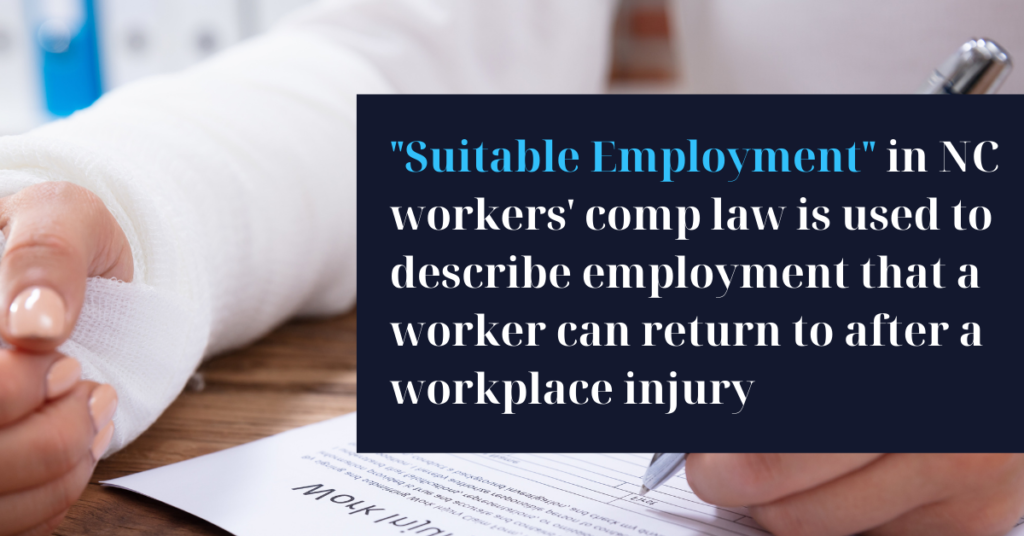Our workers’ comp lawyers are often asked by clients, “What is ‘suitable employment’ in workers’ comp law?”
The answer is a little complicated. We’ll do our best to break down “suitable employment’ in NC workers’ compensation law in this article.
Remember, if you need help with a workers’ comp case in North Carolina, we are ready to help. We don’t get paid unless you do. It’s as simple as that.
Suitable Employment in Workers’ Comp

Under the North Carolina Worker’s Compensation Act, the term “suitable employment” is often used to describe employment that an injured worker can return to after recovering from a workplace injury.
For many years, the definition of suitable employment was defined as employment that the injured worker was able to perform physically in light of his or her doctor’s restrictions, that paid wages close to what he or she was earning before the injury, and that was a real job in the economy (e.g., your employer could not make up a new job position simply to try to end your worker’s compensation benefits).
But in 2014, North Carolina law was changed.
Two Definitions of Suitable Employment
For all worker’s compensation claims arising on or after June 24, 2014, suitable employment is defined by law in N.C.G.S 97-2(22). That law actually has two different definitions of suitable employment, depending on where the claimant is in the healing process. Basically, the statute sets forth that suitable employment means different things for claimants depending on whether they have reached Maximum Medical Improvement.
Maximum Medical Improvement, or MMI, means when the claimant has recovered or “improved” as much as he or she is ever going to. Some use the term “plateaued” as in, the injured worker’s condition was going up and up, and then it reached a flat point and stopped improving. His or her recovery “plateaued.”
MMI does not mean that the injured worker will not need additional medical care. He or she might still be in therapy, receiving prescription medications, and he or she might even need surgeries at some point in the future. But MMI does mean that the injured worker is now as good as they are going to get. He or she will never improve more and the doctor is able to assign permanent restrictions on what kind of physical job duties he or she can do going forward.
“Suitable Employment” BEFORE Reaching MMI
Under N.C.G.S 97-2(22), before an injured worker has reached MMI, suitable employment means any employment offered to the injured worker that the injured worker is able to perform within the physical restrictions assigned by the treating physician. Note that this definition does not say that the employment offered needs to be a real job. That means that your employer can offer you “make work” or create a job for you just to get you back at work. The job does not have to pay the injured worker what he or she earned before your injury, although the North Carolina Worker’s Compensation Act provide that if the position pays significantly less than what the worker was earning before his or her injury, the injured worker can apply for supplemental payments (called “Temporary Partial Disability”, or “TPD”) under the Worker’s Comp Act to bring his or her earnings back in line with what he was taking home before his injury.
“Suitable Employment” AFTER Reaching MMI
After an injured worker has reached MMI, N.C.G.S 97-2(22), the definition of suitable employment changes.
After reaching Maximum Medical Improvement, a suitable job is one that meets several criteria, including that the job must be:
- Within 50 miles of the employee’s home
- One that the injured worker can safely perform under his or her doctor’s restrictions
- Reasonable in light of the injured worker’s health conditions unrelated to the workplace accident (for example, diabetes, hearing impairment, etc.)
- Reasonable in light of the injured worker’s work skills, education, and experience
Note that the definition of “suitable employment” after MMI does not mention “make work.” That means that while your employer can “make up” a job for you on a temporary basis while you are recovering from your injury, that make-work job is no longer suitable for you once you have reached MMI.
On some level, this makes sense. An employer might want to create a job for an employee on a transitional basis to ease them back onto the job while he or she is recovering from the workplace injury. But we do not want employers to be able to permanently park employees in “made up” jobs that are not available anywhere else in the economy just to avoid paying worker’s compensation benefits.
Complicated Cases
Of course, writing out a definition of suitable employment into a law is easy enough. In practice, things often get much more complicated.
Examples include:
- What happens if your employer asks you to come back to work in a light duty job sitting at a desk, then starts asking you to lift boxes and things that your doctor told you not to do?
- What happens when your employer asks you to come back to work and work hours that do not work with your family’s schedule?
- What happens if your family physician tells you something different than your workers’ comp treating physician?
Need Help with Your Workers’ Comp Case? We Are Ready to Help
If you are struggling with questions related to suitable employment, maximum medical improvement, or any other issue concerning your workers’ comp claim, call Riddle & Brantley today.
Every day, we help injured workers navigate the workers’ compensation system and protect their rights under the Workers’ Compensation Act. In cases involving long-term disability, our disability attorneys can also help you with obtaining Social Security disability benefits.
“I would like to thank Riddle & Brantley for doing such a great job handling my workers’ compensation case.”
-Gregory S., Riddle & Brantley client

For a FREE consultation with an experienced workers’ compensation lawyer, call 1-800-525-7111.
Our work injury team is led by two Board-Certified Specialists in Workers’ Compensation, attorneys Chris Brantley and Adam Smith, both of whom have been recognized by the NC State Bar for their expertise and experience handling these cases.
In one recent case, our attorneys helped an injured construction worker recover $2,475,000 in compensation for a workplace injury (see disclaimer below). We are proud of the results we’ve secured for our deserving clients and their loved ones, and we’re ready to help however we can.
Justice Counts.
*** Disclaimer: The results mentioned are intended to illustrate the type of cases handled by the firm. These results do not guarantee a similar outcome, and they should not be construed to constitute a promise or guarantee of a particular result in any particular case. Every case is different, and the outcome of any case depends upon a variety of factors unique to that case.